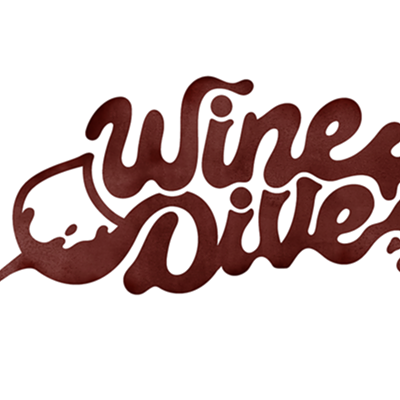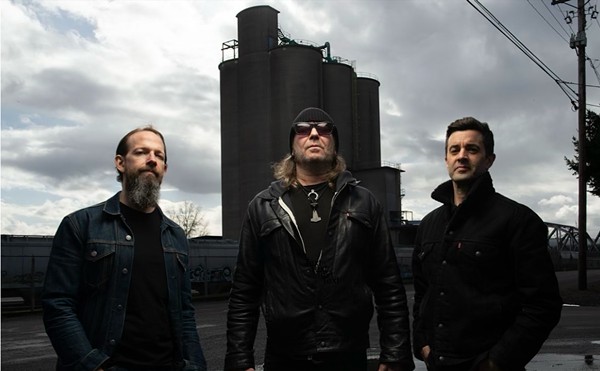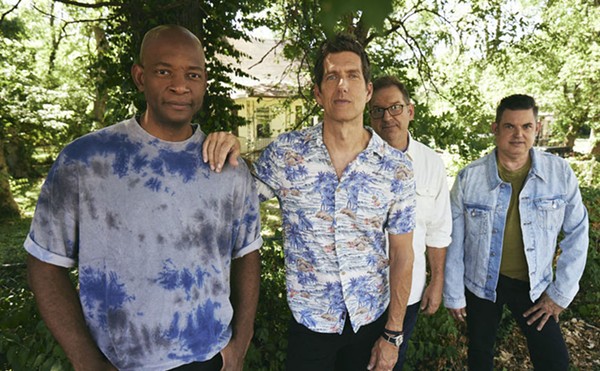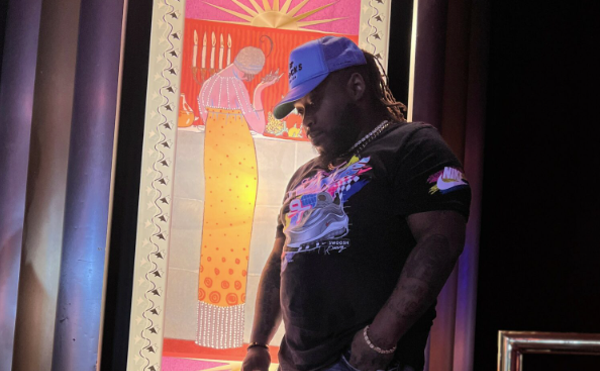"You ask me for fucking lyrics?" the Prick frontman says, referring to his dark, often impenetrable music. "It is the sound, and that's all there is."
McMahon's words, his very being, are bewildering. He can be funny, even charming, but also unabashedly feral. He glares at you if you suggest his music is a product.
Please. This is art.
Under the names Lucky Pierre and Prick, McMahon has been creating dark and brilliant aural collages since the early '70s. He's been on the outside of the record industry. He's also been way inside. His second Prick effort, the bizarre, stunning The Wreckard, is available only over the Internet.
"The trouble with the record business is, the bigger it gets, the more it loses its face," McMahon says. Seven years ago, Prick released its self-titled debut on Nothing Records. It sold 66,000 copies, according to Soundscan. Because it came out on Nothing Records, the boutique label of Nine Inch Nails frontman Trent Reznor, NIN overshadowed it, making it something of an albatross for McMahon; he has nothing to do with Nothing these days.
The Wreckard has sold almost 3,000 copies since February on the strength of chat rooms, scattered reviews, and a creative website. Its predecessor is good, if a bit busy, with four of its 10 tracks produced and engineered by Reznor. This one, produced by McMahon with input from producer/bassist Warne Livesey and drummer/soundshaper Garret Hammond, is far less filtered. A cartoon of Prick's music would depict a glam-rock alley cat, its tail stuck in a wall socket. McMahon's voice is the missing link between David Bowie and Johnny Rotten. The perfect antidote to Creed (as a fan wrote in a Prick chat room), that voice is the most distinctive characteristic of songs that leak into one another, songs that may trap 20 years of recording in a single tune.
His first original song popped into the head of this damaged Catholic boy as he sat in Brother Giles' ninth-grade algebra class at St. Edward's in Lakewood.
"Instead of solving some fucking equation, I wrote my first song," he says. "Algebra made me think there's an answer, even when you're just looking at the question. I knew the answer was the song, so I figured, 'Well, I will write the song. I just have to think of it first.'"
McMahon's songs resonate across texture, tone, and time. There are hundreds. He has sat on some for decades, because he hates to finish them.
The 14 tracks on The Wreckard cover material dating all the way back to 1981, when McMahon was focusing his energies on Lucky Pierre. They span the nasty "Wet Cat," the futuristic, stuttering, and loopy "Humanerace," and a pretty piano ballad, "Universe." The disc is a compelling blend of desire and distortion. It is decidedly unorthodox.
"I'm not waging a war against the industry or the distribution paradigm," says McMahon. "If a distributor offered me some kind of reasonable deal, I'd definitely entertain the idea. I just don't want to get sewn up with somebody who's going to stop me from putting out as much music as I want."
"I think it's kind of smart," says Alternative Press Editor Jason Pettigrew, of McMahon's decision to avoid the traditional label route for the time being. "You don't have to deal with distributors who have very creative accounting practices.
"Record labels want you to tour, to make sure you play that big hit single every night," Pettigrew continues. "Prick's 'Animal' got a fair amount of MTV play, but Kevin just couldn't be bothered."
Go to McMahon's website, www.prickmusic.com, to sample tunes, inspect Prick graphics, and order The Wreckard. McMahon is living on the album's proceeds -- along with intermittent royalties from the use of "Animal" in the movies Showgirls and Fear -- while he works toward releasing an Internet-only Lucky Pierre compilation by fall (a separate Lucky Pierre website is under construction).
McMahon isn't one to relinquish control again. He did that during the Nothing years, when he was signed to Interscope.
"Interscope was a young enough company where they were saying, 'We have only 12 artists, and it's not like we're going to be throwing out 15 a month and see what sticks,'" McMahon says. "'We're going to try to pay attention to you.'
"As time passed, the record came out, they signed more and more people, and all of a sudden, the idea of me doing a record every year or every 18 months turned into 'Well, there's no commercial radio hit here anymore, you need to do a commercial radio kind of thing.'"
In '95 and '96, Prick toured with NIN and Bowie, "Animal" got scattered radio play, and McMahon grew tired of the grind.
"In different cities, the record did pretty well; in other cities, it didn't make it, because 'Animal' was too dark or the title of the band was too dark," McMahon says.
"I've always been really into his music and the fact that he keeps going," says Tony Ciulla, manager of Marilyn Manson, another former Nothing artist, whose next album is due out on Interscope. "The one thing about Kevin that may have interrupted his mainstream success is his lack of interest in conforming to the record company format of touring and interviews, which he was never big on. Kevin getting into a bus and driving across the country is not his idea of a good time."
McMahon got his songs back from Interscope in 1999, after NIN manager John Malm told him Interscope would no longer support his efforts at a Prick follow-up. "Then I had to start working on the publishing arrangements," he says. "It was a long death."
Nothing publicist Susan Swan would only say that Prick is no longer on the label. Former Lucky Pierre fan (and, for a minute, manager) Malm would not comment. No attempt was made to reach the notoriously unreachable Reznor.
While McMahon credits Malm and Reznor with helping to raise his profile and says he bears them no ill will, it has long been time to move on.
"I'd love to stand still, but I can't," he says. "I spent too much time getting out of where I was for that little dip in the sunshine; I'm not going to get back into it unless it's what I want it to be for.
"I have nothing against working with people," says McMahon. "I know I'm not the only person in the world. At the same time, I'm not going to stand in a lineup of competitive idiots, looking for a chance at the big time."














